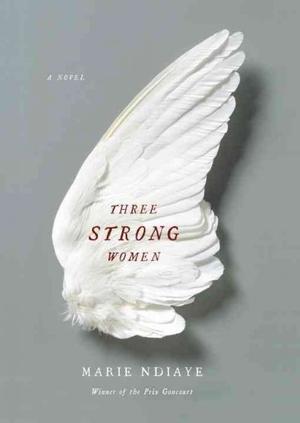
image via the Strand website
title: Three Strong Women [support an independent bookseller and buy at Strand]
by: Marie NDiaye
genre: literary fiction
pages: 293
published: 2009, translated in 2012
source: my personal library
Bird. Bird. Bird. Bird is the word.
If you like gratuitous avian symbolism, you won’t egret picking up Marie NDiaye’s Prix Goncourt-winning Three Strong Women! (see what I did there??? I CAN’T RESIST A BAD PUN!) More on our fine-feathered friends later…
The work is broken into three parts, each focusing on a different woman with ties to Senegal. Part I follows Norah, a French-born woman of Senegalese descent who finds herself returning to Africa at the strong request of her father. Part II only focuses on a female character, Fanta, peripherally, as the action follows her husband, Rudy Descas. Lastly, Part III follows recently widowed Khady, who has been sent away by her deceased husband’s family.
I have SO MANY FEELINGS about this novel. First there’s the title. Without giving too much away, the title HAS to be ironic, because the women in this book are the opposite of strong and powerful. They are walked on, manipulated, abused, and ignored by the men in their life. Sometimes survival just isn’t enough. For these women to be considered “strong,” they would have had to have learned something or evolved in some way…not merely endured. But endure they do, and usually despite the men in these intertwined stories.
And the men. Lord, the men. The only redeemable male character in the entire novel is dead before the action even begins. In Part I, we meet Norah’s father, who may or may not be involved in a death Norah’s brother is currently incarcerated for. He is probably one of the most vile characters I’ve ever come across in literature: he’s arrogant and self-aggrandizing, evasive and withholding. And deeply troubled. Case in point: Norah finds him perched in a tree several times during her time in Senegal (See? I TOLD YOU I’d get back to the birds!), which is the first iteration of NDiaye’s pervasive use of bird-related symbolic imagery. Birds, traditionally, symbolize freedom, and Norah’s father sees himself as free from responsibility for his actions, above the law and judgment other than his own. The thing that really stood out for me about Part I is the overwhelming sense of unreality that oozes from the narrative. As I read, I felt at times as if Norah were operating in an extended dreamlike state, as there were inconsistencies in the narrative (her children and boyfriend were in France…oh wait, now they’re suddenly, unexpectedly at a hotel in Senegal having lunch but Norah doesn’t really talk about how BIZARRE that is…) and a ton of Jungian symbolism (Norah pees herself several times over the course of the action, which we know, in dreams, symbolizes a loss of control).
More birds and more symbolism figure prominently into Part II, this time as a literal buzzard, symbolizing death, that stalks Fanta’s despicable husband, Rudy Descas, who also may or may not be capable of murder, just like his dear old dad (in NDiaye’s universe, men are manipulative and murderous, or mute and missing from the story). Part II follows Rudy during what the most uncomfortable day ever, and the longest portion of the story, where he says unspeakable things to his wife, is humiliated at work, deals with anal piles (Not kidding. There is a lot of ass scratching in Part II. Probably more than necessary), is stalked by the aforementioned buzzard, and is generally haunted by his past. Basically, his karma is manifesting itself all over these 100+ pages. And it’s not a comfortable read.
Part III is short, but not sweet, as it follows the widowed Khady as she her husband’s family literally packs her up and ships her out of their lives, thrusting her into the hands of those responsible for smuggling the struggling into Europe in super-shady-black-market ways. More bird imagery, as Khady imagines one the men driving her caravan of aspirational European immigrants, to be a pied crow, a South African species of crow that is black and white. Crows, as you’re probably aware, symbolize ill fortune, and Khady definitely experiences her share of that…
Overall, I appreciated the stories that NDiaye was compelled to tell, and the voices (or lack thereof) she brought to the forefront of this novel. But her style…I found her voice hard to follow and inconsistent, and her use of superficial symbolism a bit excessive…this was not a book I enjoyed reading. That said, this piece got me thinking and writing more than usual…to move the reader in that way and to initiate a conversation is a huge accomplishment and really the goal of great art. And there, NDiaye absolutely succeeded.
Rubric rating: 7.5 I definitely want to read more of NDiaye’s work, but I’m going to need to emotionally prepare myself first…